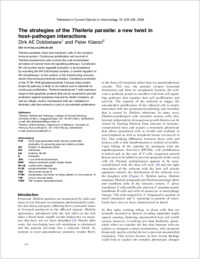The strategies of the Theileria parasite: a new twist in host–pathogen interactions
- Dobbelaere, Dirk AE Division of Molecular Pathology, Institute of Animal Pathology, University of Bern, Switzerland
- Küenzi, Peter Division of Biochemistry, Department of Medicine, University of Fribourg, Switzerland
-
15.06.2004
Published in:
- Current Opinion in Immunology. - 2004, vol. 16, no. 4, p. 524-530
English
Theileria parasites infect and transform cells of the ruminant immune system. Continuous proliferation and survival of Theileria-transformed cells involves the well-orchestrated activation of several host-cell signalling pathways. Constitutive NF-κB (nuclear factor kappaB) activation is accomplished by recruiting the IKK (IκB kinase) complex, a central regulator of NF-κB pathways, to the surface of the transforming schizont, where it becomes permanently activated. Constitutive activation of the PI-3K–PKB [phosphoinositide 3-kinase–(Akt) protein kinase B] pathway is likely to be indirect and is essential for continuous proliferation. Theileria-transformed T cells express a range of anti-apoptotic proteins that can be expected to provide protection against apoptosis induced by death receptors, as well as cellular control mechanisms that are mobilised to eliminate cells that entered a cycle of uncontrolled proliferation.
- Faculty
- Faculté des sciences et de médecine
- Department
- Département de Médecine
- Language
-
- English
- Classification
- Biological sciences
- License
-
License undefined
- Identifiers
-
- RERO DOC 4355
- DOI 10.1016/j.coi.2004.05.009
- Persistent URL
- https://folia.unifr.ch/unifr/documents/299553
Statistics
Document views: 131
File downloads:
- Texte intégral: 404
